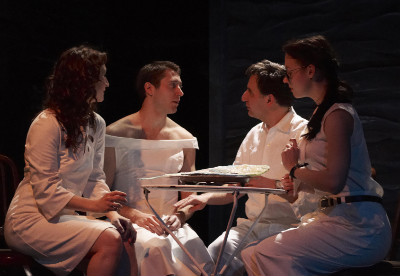Besharet

(L-R): The full cast of Besharet: Olivia Rorick as Ruth, MacLeod Andrews as Eli, William Green as Samuel and Tia Stivala as Renee. Photo by R. Perry Flowers..
BOTTOM LINE: An intense and intellectual domestic drama that draws from Jewish folklore.
In a pivotal scene that follows one of the many mystical moments in Besharet (pronounced “ba-SHARE-it”), one character asks another, “Would you rather be a dybbuk or a golem?” Both, we learn, are bodies that operate as vessels. But, while a dybbuk is a living person who channels dead souls, a golem is a soulless vessel intended to help the living. The scene is important because, if you are not familiar with Jewish folklore, it gives you some insight into what Chana Porter had in mind when she wrote the play.
In a sense, Besharet (which, we learn, means “soulmate” or something akin to “destiny”) is a typical domestic drama, set in New York City in the early 1980s. Samuel (William Tatlock Green) is a Jewish lawyer who lives on the Upper East Side with his wife Ruth (Olivia Rorick). Ruth desperately wants a baby, a desire which Samuel avoids discussing because Ruth has a condition that leaves her in a constant state of fatigue. Meanwhile, just to make things more complicated, Samuel’s law partner Renee (Tia Stivala) is expecting a baby, but can’t seem to get along with her husband, whom we never meet.
The normalcy of Samuel’s work and home life is disturbed when Eli, a young man fresh to New York from who-knows-where, joins the law firm as a temp, and then joins Samuel and Ruth for dinner after his first day of work. The very presence of Eli (Macleod Andrews) sets in motion a series of conversations that reveal that the rift between the married couple is far deeper and more far-reaching than their disagreement about having children. Operating somewhere in the realm of golems and dybbuks, Eli both extracts the true desires of those around him and becomes possessed with dead souls.
The cast of four gives an overall strong performance, breathing life into a story that might otherwise suffer from being overly intellectual and intense. Rorick (who just finished with Theasy favorite Goodnight Lovin’ Trail in the Frigid Festival) delivers a particularly strong performance as Ruth, the most heartfelt of the characters. Andrews also stands out as the enigmatic Eli, who repeatedly bursts into fits of passion, channels spirits of other people, and has an overall unsettling presence on stage, as exemplified by his abnormal thirst for water.
The design is strong and enticing. Eric Berninghausen’s set is beautiful and functional, and features reeds (like you’d see at the shore of a lake) that have a constant but unacknowledged presence. Emily Peterson’s costumes capture the early 80s business class nicely, except for Renee’s thick-framed glasses, which look like they were purchased on St. Marks Place for five dollars.
It should come as no surprise that, given the intellectual spin on the story, Porter’s bio includes affiliations with both Julliard and Yale. With the complex plot and often dense and philosophical dialogue, Porter expects a lot of investment and intelligence from her audience. As is often the case with such ambitious concepts, Besharet spins out a little toward the end as it tries to come down from the intensity and tie up loose ends. But if you are comfortable with ambiguity and don’t mind giving Besharet your undivided attention for two hours, you may find yourself fully immersed in the unique world that’s created on the stage. It wouldn’t hurt to know what a dybbuk is, either.
(Besharet plays at 9th Space Theater, 150 1st Avenue (home of PS 122), through March 27, 2011. Performances are Wednesdays through Saturdays at 8PM and Sundays at 3PM. General admission tickets are $18, or $15 for students or seniors, and can be purchased by visiting 9thspace.org or by calling 212.352.3101.)

